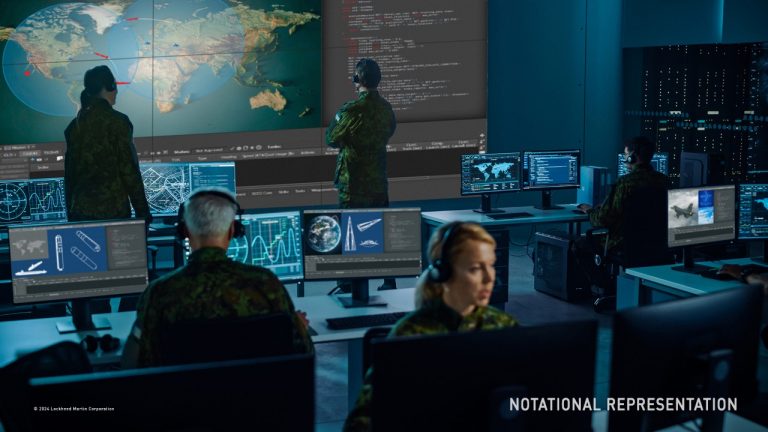Addressing the Needs of the Future Battlespace
Today’s challenges to global security are accelerating. Prevailing in future conflicts requires the ability to understand and respond to situations faster than our adversaries. Timely and effective mission planning is essential to shape the battle of the future. And Lockheed Martin is developing ways to optimize the command and control of systems, sensors and platforms across multiple domains and across theaters.
Optimizing Awareness Across Domains
For decades, Lockheed Martin has developed enterprise level ‘systems of systems” that traverse domains to provide common situational awareness and coordinated command of the battlespace. From enabling the Ballistic Missile Defense System to operate as a global network through C2BMC, to enabling the unknown in Space to become known through iSpace, we are focused on enabling full spectrum battle management.


25 Years Supporting Air Battle Management
In 1995, Lockheed Martin was awarded a contract by the U.S. Air Force to develop a solution to expedite the ATO cycle – the Theater Battle Management Core Systems (TBMCS). This new network created a shared common operational picture and provided a full range of air mission planning and execution, sensor data and intelligence gathering. Present at Air Operations Center (AOC) around the world, TBMCS is the joint battle management system used by all air wings of the United States military to plan and execute air operations. TBMCS coordinates virtually everything flown by the military, from fighters to helicopters to cruise missiles. By integrating command and control systems for the Air Force and Navy with ground systems for Army and Marine Corps, TBMCS enables synchronized air battle management.
Nuclear Command and Control
For nearly 20 years, Lockheed Martin has partnered with the U.S. Strategic Command (USSTRATCOM) to help advance their nuclear deterrence mission and nuclear command, control and communications (NC3) capabilities. From architecting nuclear command and control environments under the Computing Environment Strategic Command Architecture (CESAR) program, to sustaining the nuclear command and control system of record and developing collaborative planning systems in the Integrated Strategic Planning and Analysis Network (ISPAN) we have been committed to the USSTRATCOM mission. As the customer moves to an Agile environment, we are applying our agile development, security and operations (DevSecOps) expertise to the Rogue Blue Software Factory. Rogue Blue supports the Global Strike and Product Support (GSPS) program, which delivers nuclear planning, decision support, and intelligence capabilities for the USSTRATCOM Mission Planning and Analysis System (MPAS).


Exploring Collaborative Mission Planning
While today a joint mission can take days to plan, we are working to significantly reduce that timeline. To enable coordinated multi-domain mission planning, we developed the Multi-Domain Synchronized Effects Tool (MDSETTM), which links traditionally stove-piped resources and shortens the “data-to-decision” cycle. This involves assimilating essential information from stove-piped systems to provide concurrent (vs. serial) awareness with automated, real-time information exchange. Removing the manual entry of information from one system to another shrinks a laborious and error-ridden process into near instantaneous actions – resulting in shared situational awareness, faster decision making and multi-dimensional employment of forces. By eliminating stovepipes from battlespace planning, MDSET transforms command and control into a collaborative cross domain decision-making framework.
Using Artificial intelligence to Accelerate Decision Making
As Multi-Domain operations become real, we can expect to see the number of platforms and systems connected in the spectrum to greatly increase. This will increase the complexity, interconnectedness, volume and speed of operation, which could overwhelm the operations tempo. By advancing artificial intelligence and machine learning capabilities, we can change the human role from “in-the-loop” controller to “on-the-loop” thinker who can focus on strategy versus the execution detail. When time is limited or when the number of choices is too large for people to be able to analyze all alternatives, AI and Machine Learning help link multiple data sets from disparate users from disparate data formats, taking the burden off of the analyst. Integrating AI and machine learning into the command and control process will allow us to analyze terabytes of data much faster, and consequently make quicker decisions and gain operational advantage over our adversaries.


C2 Ground Systems for Any Mission
Modern mission operations require the ability to access and share multi-domain intelligence no matter where you are. In many instances, key intelligence comes from ground stations that glean data from a wide array of manned and unmanned platforms to keep our forces informed. We customize fixed and mobile ground stations support a multitude of operational needs for missions as diverse as aerial reconnaissance, launch & recovery operations, mobile data centers, weather services and missile defense. Our transportable ground systems are designed and built to meet rigorous federal and military standards including ICD-705, MIL-STD-464, and ATTLA. We also provide subject matter expertise in 3D modeling, finite element analysis, reliability maintainability, and availability modeling, center of gravity, thermal analysis, acoustics, and size, weight & power models. Shelters are fully customizable in assorted sizes and packable in a variety of configurations for customers in any environment - frigid cold to scorching hot climates, as well as dry, wet, or windy conditions.






